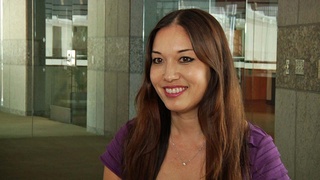Interviews
Early consciousness of identity
I became conscious pretty early, because I grew up in Covina, about a half hour from here. And my family, besides my father who’s English/Irish descent from New York, my family is entirely Chinese, from China. My brother and my sisters are all full-blooded Chinese from China, as are all of my cousins, so I was the only Hapa kid in the entire family. So to me I was always the white kid, I was like the one American kid who didn’t speak Chinese and so forth.
And I think when I was five years old I went to kindergarten for the first day and this was at the time a really white area. And to come in and realize, like, “Whoa, you’re not fitting in here at all, you’re like the only brown kid in the whole school.” That’s when I realized that these things really make a big difference to people.
Date: May 3, 2006
Location: California, US
Interviewer: Jim Bower
Contributed by: Watase Media Arts Center, Japanese American National Museum.
Explore More Videos

On Challenging Institutions
(1938-2020) Japanese American attorney and civil rights activist

Pop and Balls
(1938-2020) Japanese American attorney and civil rights activist

Re-examining Identity
(1941-2018) Japanese Canadian photojournalist and activist

Fitting in to both sides of her family
Jewish Japanese American journalist


Culture is an important part of one's identity
Jewish Japanese American journalist



Conflicted about immigrating to America (Japanese)
(b. 1925) War bride

Defining "Nikkei"
(1941-2018) Japanese Canadian photojournalist and activist

Unique Identity from Having Multiple Backgrounds
(b. 1938) Philipines-born hikiagesha who later migrated to the United States.

Growing up Japanese in Hawaii
(b. 1952) Former banking executive, born in Hawaii



Parents identification as Peruvian Okinawan
Okinawan American whose parents are from Peru.
